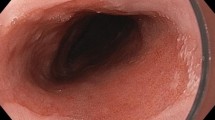Abstract
Background
The purpose of the study was to evaluate upper abdominal symptoms in laryngopharyngeal reflux (LPR) patients and changes in both upper abdominal and LPR symptoms before and after acid-suppression therapy.
Methods
In 100 patients with LPR symptoms, upper abdominal and LPR symptoms were evaluated by using the Frequency Scale for the Symptoms of Gastroesophageal Reflux Disease (FSSG) and the LPR symptom scoring system, respectively. In the 52 assessable patients, changes in these symptoms before and after acid-suppression therapy were evaluated.
Results
Upper abdominal symptoms were reported by 96/100 LPR patients: 89 responded positively to at least one of the questions about acid reflux-related symptoms and 89 to at least one of those about dysmotility-like symptoms. There was poor correlation between positive rates to FSSG upper abdominal symptom questions and the frequency of reported laryngopharyngeal symptoms. There were significant reductions in the frequency of acid reflux-related symptoms, dysmotility-like symptoms, and laryngopharyngeal symptoms after acidsuppression therapy. The LPR symptom score decreased to less than half the pretreatment score in 25 subjects (therapeutic response group). The pretreatment frequency of dysmotility-like symptoms seemed to be higher in the nonresponse group than in the response group, although the difference was not significant. There was no significant difference between the two groups in the pretreatment frequency of acid reflux-related symptoms.
Conclusions
The majority of these Japanese LPR patients experienced some form of upper abdominal symptoms. The frequency of dysmotility-like symptoms was similar to that of acid reflux-related symptoms. The pretreatment frequency of dysmotility-like symptoms, but not of acid reflux-related symptoms, might be a predictor of patient response to acid-suppression therapy.
Similar content being viewed by others
References
Koufman JA. The otolaryngologic manifestations of gastroesophageal reflux disease (GERD): a clinical investigation of 225 patients using ambulatory 24-hour pH monitoring and an experimental investigation of the role of acid and pepsin in the development of laryngeal injury. Laryngoscope 1991;101:1–78.
Hopkins C, Yousaf U, Pedersen M. Acid reflux treatment for hoarseness. Cochrane Database Syst Rev 2005(3) Accession No. 00075320-10000000-03935.
Ford CN. Evaluation and management of laryngopharyngeal reflux. JAMA 2005;294:1534–1540.
Vaezi MF. Extraesophageal manifestations of gastroesophageal reflux disease. Clin Cornerstone 2003;5:32–38.
Kusano M, Shimoyama Y, Sugimoto S, Kawamura O, Maeda M, Minashi K, et al. Development and evaluation of FSSG: frequency scale for the symptoms of GERD. J Gastroenterol 2004;39:888–891.
Belafsky PC, Postma GN, Koufman JA. Validity and reliability of the Reflux Symptom Index (RSI). J Voice 2002;16:274–277.
Oridate N, Takeda H, Yamamoto J, Asaka M, Mesuda Y, Nishizawa N, et al. Helicobacter pylori seropositivity predicts outcomes of acid suppression therapy for laryngopharyngeal reflux symptoms. Laryngoscope 2006;116:547–553.
Oridate N, Takeda H, Asaka M, Nishizawa N, Mesuda Y, Mori M, et al. Acid-suppression therapy offers varied laryngopharyngeal and esophageal symptom relief in laryngopharyngeal reflux patients. Dig Dis Sci Epub 2007 Dec 13.
Armstrong D, Bennett JR, Blum AL, Dent J, Timothy de Dombal F, Galmiche JP, et al. The endoscopic assessment of esophagitis: a progress report on observer agreement. Gastroenterology 1996;111:85–92.
Kusano M, Shimoyama Y, Kawamura O, Maeda M, Kuribayashi S, Nagoshi A, et al. Proton pump inhibitors improve acid-related dyspepsia in gastroesophageal reflux disease patients. Dig Dis Sci 2007;52:1673–1677.
Carrau RL, Khidr A, Crawley JA, Hillson EM, Davis JK, Pashos CL. The impact of laryngopharyngeal reflux on patient-reported quality of life. Laryngoscope 2004;114:670–674.
Park W, Hicks DM, Khandwala F, Richter JE, Abelson TI, Milstein C, et al. Laryngopharyngeal reflux: prospective cohort study evaluating optimal dose of proton-pump inhibitor therapy and pretherapy predictors of response. Laryngoscope 2005;115:1230–1238.
Karkos PD, Wilson JA. Empiric treatment of laryngopharyngeal reflux with proton pump inhibitors: a systematic review. Laryngoscope 2006;116:144–148.
Sen P, Georgalas C, Bhattacharyya AK. A systematic review of the role of proton pump inhibitors for symptoms of laryngopharyngeal reflux. Clin Otolaryngol 2006;31:20–24.
Vaezi MF, Richter JE, Stasney CR, Spiegel JR, Iannuzzi RA, Crawley JA, et al. Treatment of chronic posterior laryngitis with esomeprazole. Laryngoscope 2006;116:254–260.
Author information
Authors and Affiliations
Rights and permissions
About this article
Cite this article
Oridate, N., Takeda, H., Mesuda, Y. et al. Evaluation of upper abdominal symptoms using the Frequency Scale for the Symptoms of Gastroesophageal Reflux Disease in patients with laryngopharyngeal reflux symptoms. J Gastroenterol 43, 519–523 (2008). https://doi.org/10.1007/s00535-008-2189-2
Received:
Accepted:
Published:
Issue Date:
DOI: https://doi.org/10.1007/s00535-008-2189-2




